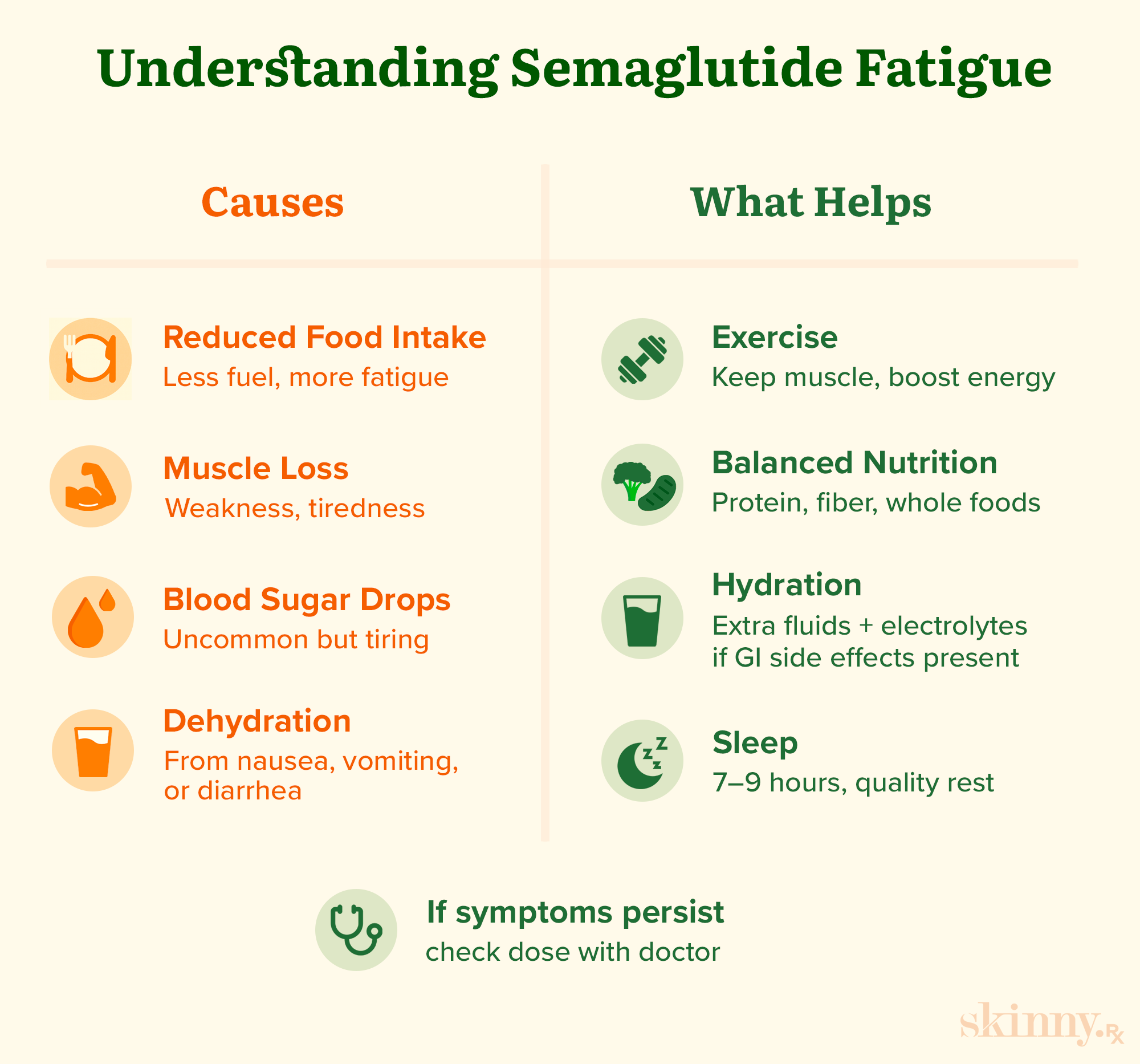
At a Glance
- Causes: Fatigue on semaglutide may stem from reduced calorie intake, loss of muscle, dehydration from GI side effects, or, less commonly, blood sugar drops.
- Prevalence: Around 5–6% of people on semaglutide experience fatigue, ranging from mild tiredness to more persistent exhaustion.
- Lifestyle Help: Regular exercise, balanced nutrition, proper hydration, and quality sleep often reduce fatigue and improve overall energy.
- Medical Adjustments: If semaglutide fatigue doesn’t improve, a healthcare provider may recommend adjusting the semaglutide dose.
- When to Worry: Severe, prolonged fatigue—especially when combined with GI symptoms or weakness—may signal the need for medical attention.
After starting semaglutide, you may notice you feel more exhausted than usual, leading you to ask, “Why am I so tired on semaglutide?”
Semaglutide fatigue is usually temporary. It’s often caused by changes in eating habits that lead to a short-term dip in energy as the body adjusts to eating fewer calories. For some, semaglutide fatigue may also be linked to muscle loss, blood sugar drops, and dehydration.
Ahead, we’ll dive into each of these causes, how long the fatigue lasts, and five science-backed ways to fight it.
Why Does Semaglutide Cause Fatigue?
Fatigue is almost always listed as a potential side effect of semaglutide, and 5-6% of people on semaglutide experience exhaustion or fatigue due to this drug. But why exactly does this fatigue happen?
The answer is often related to how semaglutide affects eating habits, blood sugar, or muscle mass, though potential adverse effects may play a role too.
Changes in eating habits
Semaglutide suppresses appetite, which is part of the reason this drug is so effective for weight loss. Because of the drug’s appetite suppression, individuals on semaglutide eat less which may cause some fatigue as the body adapts to lower caloric intake.
Usually, these dips in energy disappear over time, as the body adjusts to a new eating pattern.
Muscle loss
The average weight loss in one clinical trial with Wegovy was 15% in 68 weeks, a significant reduction. While most semaglutide weight loss is from fat, some individuals may lose a meaningful amount of muscle mass.
Preserving muscle is important to fend off weakness and physical fatigue, especially as we age. In one case study, an older adult who took semaglutide for type 2 diabetes lost eight kilograms (about 18 pounds) of muscle and felt more fatigued.
Blood sugar drops
If blood sugar dips too low, this may indicate hypoglycemia, a condition where the glucose in the blood drops below what’s healthy, leading to symptoms like lightheadedness, feeling tired, and confusion.
Fatigue caused by blood sugar drops is rare, usually occurring when medication is not taken consistently, when semaglutide is used alongside other blood sugar medications, or when someone increases their dosage too fast.
While we often think of semaglutide as a weight loss medication, it’s also effective for controlling type 2 diabetes. That’s because this drug mimics the effects of GLP-1, a naturally occurring hormone that plays a role in lowering blood sugar after eating.
Dehydration
To understand the link between dehydration and semaglutide fatigue, we have to first discuss the drug’s potential gastrointestinal (GI) side effects. GI side effects are some of the most common for semaglutide, with diarrhea occurring for about 30% of semaglutide users, vomiting for 24.5%, and nausea for about 43.9%.
If vomiting or diarrhea are severe, someone may lose significant fluid and electrolytes, minerals that help maintain hydration, nerve function, and muscles, leading to dehydration. Someone may feel fatigued or tired when dehydrated since their body doesn’t have enough fluids to operate as it should.

When to Expect Fatigue—And How Long It Lasts
There isn't an exact timeline for when semalgutide fatigue starts and when it will go away. This fatigue usually starts as soon as someone takes the drug or after increasing the dosage to a level that causes adverse side effects. It can be temporary as the body adjusts to semaglutide or lasts for longer, depending on the cause.

In my practice, when people on a GLP-1 complain of fatigue, it’s often the first day or two after their weekly injection. Sometimes it occurs when they’re starting for the first time at a higher dose, however, for a few patients, fatigue can persist for several weeks. I counsel my patients that we should look out for red flags, such as severe G.I. symptoms, persistent weakness, or exhaustion that limits daily activities, and also keep good habits that maintain muscle mass, keep hydrated, and blood sugar stable. If we can focus on this, then people can do very well and have great long-term success.
–
Dr. Daniel McGee, Board-certified Family Medicine Physician
5 Science-Backed Ways to Combat Semaglutide Fatigue
So how exactly can you combat semalgutide fatigue? Many people find lifestyle changes are effective, though semaglutide fatigue sometimes requires adjusting the dosage as well.
Exercise
In the case study we previously referenced, an older adult lost muscle mass and felt fatigued after starting semaglutide. His doctor created a tailored exercise program to retain muscle mass, and after following it, the patient’s fatigue disappeared.
Following a personalized exercise routine that encompasses aerobic activity (biking, walking, running, etc.) and strength training can help fend off muscle loss and any related fatigue. For reference, the CDC recommends a minimum of 150 minutes of moderate aerobic activity and two strength training sessions each week.
Nutrition fixes
Eating nutrient dense meals and snacks can also help maintain muscle mass and boost overall energy levels. A balanced diet also supports semaglutide’s effect on weight and blood sugar, making it a win-win lifestyle change.
An energy-boosting diet includes:
- Legumes, like chickpeas, lentils, and black beans
- Carbohydrates, ideally prioritizing minimally processed, fiber-dense options like whole-grain bread and pasta, quinoa, brown rice, and oats
- Protein, especially minimally processed protein like grilled chicken, tofu, or Greek yogurt
- Seeds, such as sunflower, pumpkin, or chia seeds
- Fruits and vegetables, especially those with bright colors like spinach and strawberries
Hydration & electrolytes
Whether adverse GI effects are causing dehydration or not, staying hydrated is often a good idea. Recommended daily water intake depends on many factors, such as your gender, age, activity level, and how hot it is outside.
If you are experiencing diarrhea, vomiting, or other adverse events that lead to a loss of fluids, you’ll need to drink more water than usual.
Sleep optimization
Sleeping seven to nine hours each night can help boost energy levels. Yet it isn’t just about how long you’re asleep, but also the quality of sleep. To boost sleep quality:
- Wake up and go to bed at the same time each day (even on weekends)
- Keep the bedroom quiet, dark, and cool
- Turn off electronics 30 minutes to one hour before sleeping
- Avoid caffeine and alcohol in the evenings
- Don’t eat large meals right before bed
- Exercise regularly
Dosing adjustments
If side effects consistently interfere with daily life, it may be time to adjust your semaglutide dose—but you shouldn’t do so on your own. Instead, make an appointment with a qualified medical provider who can assess symptoms and safely adjust your dosage.
When to Worry: Is This Normal or a Problem?
If you’ve just started semaglutide and are experiencing mild fatigue, it may not be a cause for concern. If that exhaustion interferes with daily tasks, is accompanied by severe side effects like vomiting and chronic diarrhea, or doesn’t go away, it may be time to see a medical professional.
Specific warning signs to look out for include:
- Extreme weakness
- Prolonged fatigue
- Fatigue alongside GI adverse effects
- Exhaustion that doesn’t go away with lifestyle changes
- Tiredness that interferes with your daily routine
Underlying conditions to rule out
Fatigue only occurs for about 5-6% of those who take semaglutide, and that stat includes both short-term and chronic fatigue. If experiencing ongoing tiredness, a medical condition may be to blame instead of semaglutide.
Some of the most common are:
- Anemia, when the body does not have enough red blood cells
- Thyroid issues
- Depression
- Any chronic condition or injury that causes persistent pain
- Sleep disorders
- Addison’s disease, when the adrenal glands don’t produce enough hormones
- Eating disorders
- Viral illnesses, like the flu or COVID-19
- Diabetes
- Kidney disease
- Liver disease
A healthcare provider can diagnose the underlying cause of fatigue, whether it’s semaglutide or another underlying condition.
At SkinnyRx, we offer compounded GLP-1 medications like semaglutide and tirzepatide with professional guidance. If you’re exploring treatment options, take a short assessment to see whether it may be right for you.
FAQ: Your Top Fatigue Questions Answered

Your weight-loss journey deserves proven options
Answer a few short questions to explore whether GLP-1 treatments may be a good match for you.


 Medically Reviewed
Medically Reviewed



